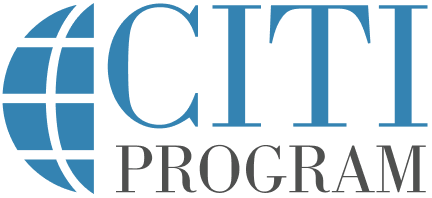The Trusted Standard in Research, Ethics, Compliance, and Safety Training
The Collaborative Institutional Training Initiative (CITI Program) is dedicated to serving the training needs of colleges and universities, healthcare institutions, technology and research organizations, and governmental agencies, as they foster integrity and professional advancement of their learners.



Explore Our Featured Courses
Provides instructions for creating the structures, personnel, and funding for a clinical research program.

Provides essential training on why privacy awareness and compliance matter.

A comprehensive introduction to ethical principles, regulations, and responsible practices that guide software and technology professionals throughout the software development lifecycle.

The course explores OPSEC in academia, training faculty, staff, and students to identify and mitigate risks to sensitive research data while upholding open science principles.

Equips university faculty, staff, administrators, and students with essential knowledge on Title IX compliance and program assessment to foster safer, more effective, and student-centered campus environments.

Helps clinical and operations leaders in safety-net and low-resource healthcare settings develop literacy and confidence in AI.

Equips research personnel with the skills and insights necessary for effective mentorship.

Explores how generative AI (GenAI) can support science communication.

Presents a scalable model for creating a research coordinator float pool to provide flexible staffing, structured training, and broad support for clinical research across institutions.

Describes how to calculate the appropriate sample size for different study designs and outcomes.

These courses explore key topics related to research security and international engagement.

Examines the application of IRB exemptions, focusing on overlooked flexibilities in categories 1 through 3 through discussion and real-world examples.

Provides a review of what COI committee members need to know.

Introduces you to key information about, and tools to use, the 3Rs of animal research.

This course provides learners with a review of contemporary bioethics issues.

The RCR Casebook course is a collection of real-world ethical dilemmas designed to promote discussion, critical thinking, and skill-building in RCR.

Explore the impact of academic integrity from the perspective of both students and faculty/staff.

Prepares you to apply digital health ethics in healthcare and research.

Explores issues that lead to research misconduct and ways to develop trust with faculty and leadership.

This webinar for IRB, IACUC, and sponsored program administrators covers seven key compliance elements with strategies and case studies to strengthen research, reduce risk, and promote integrity.

Foundational and advanced courses provide critical information and best practices for IRB administration.

This course prepares researchers and educational technology developers to navigate COPPA’s legal requirements, conduct compliant research, and engage with digital environments used by children under 13.

Describes the regulatory framework and quality programs for HCT/Ps

This course provides essential practices for those working with high-risk biological materials, clarifying biosafety vs. biosecurity and enabling practical biosecurity planning to prevent theft, misuse, or intentional release.

The webinar explores effective collaboration between IACUC and IBC, detailing their roles, regulatory responsibilities, and best practices to ensure safe and ethical life sciences research while enhancing oversight and protecting workers and animals.

An overview of PCTs, their ethical complexities, best practices, and institutional considerations.

Provides the fundamentals of ergonomics across different settings.

Helps develop leadership skills to meet today’s changing, diverse, and dynamic environments.

This course offers advanced training for experienced researchers and leaders in responsible research conduct, emphasizing integrity, ethical leadership, and fostering healthy research environments.

This course equips faculty, staff, and administrators with the fundamentals and tools to measure outcomes, improve learning, and effectiveness.

N2 is a not-for-profit alliance of Canadian research networks and organizations working to enhance national clinical research capability and capacity.

BIC Study Foundation is a resource for those who want to take CITI Program courses in Korean. They are a certified training provider by the Korean FDA/MAFRA for HRPP and ACU Programs.

A complete research compliance suite that supports IRB, IACUC Conflict of interest, Bio Safety Export Control, and more.

HRP Consulting provides customized services for your research program, including temporary staffing, IRB/IACUC assistance, accreditation support, program evaluations, training/education and more.

CTrials helps grow sponsored research programs by taking on the many administrative challenges inherent in managing clinical trials.

Informed Consent Builder is a cloud-based platform that streamlines the process of managing and generating informed consent forms.

Protocol Builder is an online protocol writing and collaboration platform that also speed up your pre-review turnaround times.


Courses Approved by Top Continuing Education Accreditors
CITI Program courses are approved for CME credits through the Albert Einstein Montefiore Continuing Professional Development Center (CPDC). Albert Einstein College of Medicine-Montefiore Medical Center (Einstein) is accredited by the Joint Accreditation for Interprofessional Continuing Education to provide continuing education activities for healthcare professionals. Einstein is accredited to offer continuing education credit for the following professions: medicine, nursing, psychology, pharmacy, dentistry, optometry, social work, nutritional science, and athletic training.
CITI Program is also accredited by the International Accreditors for Continuing Education and Training (IACET) and offers IACET CEUs for its learning events that comply with the ANSI/IACET Continuing Education and Training Standard. IACET is recognized internationally as a standard development organization and accrediting body that promotes quality of continuing education and training.
Join Over 2,500 Subscribing Organizations
Highlighted below are just a few select subscribers & collaborators.










Meet A Few Of Our Expert Authors and Presenters
Our courses are built by over 350 highly qualified experts and rigorously peer reviewed to incorporate various perspectives and ensure accuracy, completeness, and overall quality.

Sam Bigdeli, CEO
KavAI, University of LiverpoolSam is an Architect of advanced Al systems for semiconductor forecasting, enhancing efficiency and decision-making. He has led $180M in annual revenue across 17 global locations, optimizing operations and driving strategic acquisitions. Sam is an expert in enterprise application design, operational scaling, and technology integration.

Ben Bamberger, PhD
Vanderbilt UniversityBen Bamberger is the Assistant Director of Research Integrity and Compliance at Vanderbilt University. He promotes best practices for the ethical conduct of research and helps the university prepare for evolving regulations, particularly involving research security. He received a PhD in History from the University of Illinois Urbana-Champaign.

Charles Hennekens, MD, DrPH
Florida Atlantic UniversityCharles H. Hennekens, MD, DrPH is the first Sir Richard Doll Professor and Senior Academic Advisor to the Dean. He was formerly the first John Snow Professor and first Eugene Braunwald Professor of Medicine at Harvard Medical School and first Chief of Preventive Medicine at Brigham and Women’s Hospital.

Megan LaFollette, MS, PhD
The 3Rs CollaborativeDr. Megan LaFollette is Executive Director at The 3Rs Collaborative where she advances better science, for both people and animals. She received her PhD and Master of Science in Animal Behavior & Welfare from Purdue University. She is an expert in advancing implementation of practical, impactful, and evidence-based 3Rs techniques.
In Our Learners' Words

Maria E.
Evidence Based Practice Nursing Resident, Diabetes Nurse Specialist
Great information on the importance of protections in research with human subjects. I liked the audiovisual option.

Gowramma I.P.
Professor of Education
The detailed content and clarity, with examples and case studies, are what I liked best. The ability to switch between reading and A/V modes when required was also useful.

Win K.
Lecturer and Consultant Physician
The audio-visual presentation is most suited for me because it allowed me to focus more on the module content, and the questions posed during the presentation refreshed and reflected what I had learned before the module ended.

Elisa B.
College Research Professor
The course was clear and direct. It did not provide information that was unnecessary and confusing.
Recent News & Articles

New Course – Establishing a Clinical Research Program
The course supplies learners with an understanding of how to set up a clinical research site, assemble a research team, build a clinical trial portfolio, and more.
Read the article
Clinical Research for Practicing Clinicians: How to Build Your First Site
Launching a clinical research site can feel like adding a new service line to an already full clinic schedule. Most first-time sites don’t struggle because...
Read the article
Annual Research Ethics Day Conference 2026 — The Future of Research Ethic...
The University of Minnesota’s Research Ethics Day Conference will examine the evolving landscape of research ethics amid significant changes.
Read the article
